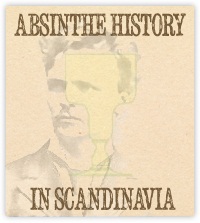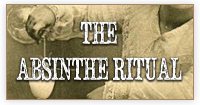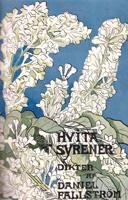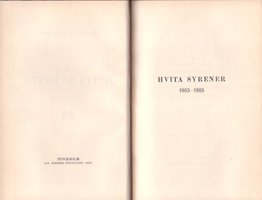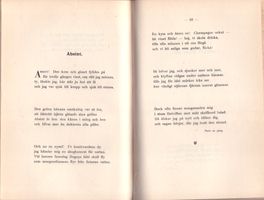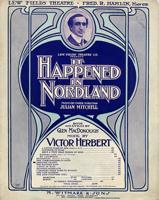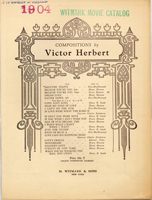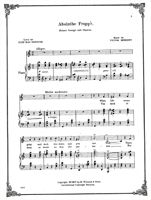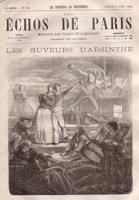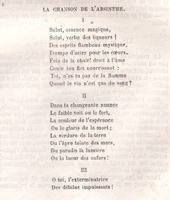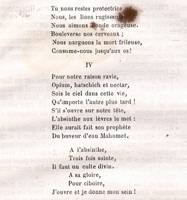Absinthe.se
The premier independent absinthe resource since 2003
Musset didn't write the way he did because he drank absinthe, instead he drank for the same reason for which he wrote just like that: namely out of despair.
Tjänstekvinnans Son
(The Son of a Servant)
Absinthe poetry
Several poems about or referencing absinthe exist all over the world. The more one digs for it the more one finds. It just never ends. Some of them I have collected here in this section of the site. Poems, quotes and excerpts from books by authors from Sweden, France, England and more.
Poems about absinthe will probably exist in all times but the best ones will likely remain the ones written during the Belle Epoque. Here is a small collection of poems that reference absinthe. Use the links in the list of authors below to jump directly to their works.
Please note that all images and texts contained on this page are subject to copyright and may not be used without the written permission of Absinthe.se or the respective owners.
- Antonin Artaud
- Marie Corelli
- Charles Cros
- Ernest Dowson
- Daniel Fallström
- Florence Folsom
- Paul Gaugain
- Gustave Kahn
- Robert Loveman
- Glen MacDonough
- Raoul Ponchon
- Francis Saltus Saltus
- August Strindberg
- Arthur Symons
- Paul Marie Verlaine
- Oscar Wilde
- Octave Féré and Jules Cuvain
Antonin Artaud, 1896 - 1948
In the early 1920's Antonin Artaud was very much influenced by the great French poets Verlaine, Mallarmé and Rimbaud. The poem Verlaine Boit was published in 1921. Between 1926-1928 Artaud also ran the Alfred Jarry theatre where he directed plays by, among others, August Strindberg. Below are both the original poem in French and an English translation.
Verlaine Boit
"Il y aura toujours des grues au coin des rues,
Coquillages perdus sue les grèves stellaires
Du soir bleu qui n'est pas d'ici ni de la terre,
Où roulent des cabs aux élytres éperdues.
Et roulent moins que dans ma tête confondue
La pierre verte de l'absinthe au fond du verre,
Où je bois la perdition et les tonnerres
A venir du Seigneur pour calciner mon âme nue.
Ah! Qu'ils tournent les fuseaux mêles des rues
Et filent l'entrelacs des hommes et des femmes
Ainsi qu'une araignée qui tisserait sa trame
Avec les filaments des âmes reconnues."
Verlaine Drinks (English translation of Verlaine Boit)
"There will always be whores on street corners,
Lost shells stranded on the stellar shores
Of a blue dusk which belongs neither here nor on earth
Where taxis roll by like bewildered beetles.
But they roll less than in my whirling head
The green gem of absinthe deep in the glass
Where I drink perdition and the thunder
Of the Lord's judgement to roast my naked soul.
Ah! How the tangled spindles of the streets
Turn and spin the fabric of men and women,
As if a spider were weaving her web.
With the filaments of uncovered souls."
Marie Corelli, 1855 - 1924
The following are all excerpts from the book "Wormwood; A Drama of Paris" (1890).
I am the green fairy
"I am the green Fairy
My robe is the color of despair
I have nothing in common with the fairies of the past
What I need is blood, red and hot,
The palpitating flesh of my victims
Alone, I will kill France, the present is dead,
Vive the future...
But me, I kill the future and in family I destroy
The love of country, courage, honor,
I am the purveyor of hell, penitentiaries, hospitals.
Who am I finally?
I am the instigator of crime
I am ruin and sorrow
I am shame
I am dishonor
I am death
I am Absinthe"
And here I am, an absintheur
And here I am, an Absintheur in the City of Absinthe,
and glory is neither for me, nor for thee Paris,
thouj frivilous, lovely, godless, lascivious dominion of Sin!
Godless!
Let me be mad!
Let me be mad, mad with the madness of Absinthe
The wildest, most luxurious madness in the world.
Let me be mad, mad with the madness of Absinthe
Give me the fairest youth that ever gladened his mothers heart
Let me be mad
Let him be hero, saint, poet - whatever you will
Let me make of him an Absintheur.
And from hero he shall change to coward
From saint to libertine
From poet to brute.
You doubt me?
Come then - to Paris.
By Venus and Cupid
By Venus and Cupid and all the dear old heathen deities
who are so remarkably convinient myths to take one's oath upon.
I hope you will not compel me to consider you a fool
Beauvais! What an idea that is of yours - 'medicinal green!'
Think of melted emeralds instead.
There beside you, you have the most marvelous cordial in all the world -
drink, and you will find your sorrows transmuted - yourself transformed!
Even if no better result be obtained than escaping the chill you have incurred in this
night's heavy drenching, that is surely enough!
Life without Absinthe! I can not imagine it!
For me it would be impossible!
I should hang, drown or shoot myself into infinitude,
out of sheer rage at the continued cruelty and injustice of the world -
but with this divine nectar of Olympus I can defy misfortune and laugh at poverty,
as though they were the merest bagatels.
Come! - to your health, mon brave! Drink with me!
That night I drank deeply
That night, the night before my wedding day,
I drank deeply and long of my favourite nectar.
Glass after glass I prepared, and drained each one off with insatiable and ever-increasing apetite.
I drank till the solid walls of my own room, when I atlast found myself there,
appeared to me like transparent glass, shot throughout with emerald flame.
Surrounded on all sides by phantoms.
Beautiful, hideous, angelic, devilish.
I reeled to my couch in a sort of waking swoon, conscious of strange sounds everywhere,
like the clanging of brazen bells, and the silver fanfaranade of the trumpets of war,
conscious too of a similar double sensation -
namely, as though Myself were divided into two persons, who opposed eachother in deadly combat,
in which neither could possibly obtain even the merest shadow-victory!
Excerpt from Wormwood: a Drama of Paris
"Would you know the single craving of my blood -
the craving that burns in me more fiercely than hunger in a starving beast of prey -
the one desire, to gratify which, I would desparately dare and defy all men?
Listen then!
A nectar, bitter-sweet - like the last kiss on the lips of a discarded mistress -
is the secret charm of my existence; green as the moon's light on a forest pool it
glimmers in my glass; eagerly I quaff it, and, as I drink, I dream.
Not of foolish things. No! Not of dull saints and smooth landscapes in heaven and
wearisome prudish maids; but of glittering bacchantes, nude nymphs in a dance of hell,
flashing torrents and dazzling mountain-peaks, of storm and terror,
of lightning and rain, of horses galloping, of flags flying, of armies marching,
of haste and uproar and confusion and death!"
Excerpt from Wormwood: a Drama of Paris
"He raised his glass glimmering pallidly in the light, - his words,
his manner, fascinated me, and a curious thrill ran through my brains.
There was something spectral in his expression too, as though the
skeleton of the man had become suddenly visible beneath its fleshly covering -
as though Death had for a moment peered through the veil of Life..."
Charles Cros, 1842 - 1888
Lendemain (With Flowers and with Women)
"With Flowers, and with Women,
With Absinthe, and with this Fire,
We can divert ourselves a while,
Act out our part in some drama.
Absinthe, on a winter evening,
Lights up in green the sooty soul;
And Flowers, on the beloved,
Grow fragrant before the clear Fire.
Later, kisses lose their charm
Having lasted several seasons;
And after mutual betrayals
We part one day without a tear.
We burn letters and bouquets.
And fire takes our bower;
And if sad life is salvaged
Still there is Absinthe and its hiccups.
The portraits are eaten by flames.
Shrivelled fingers tremble.
We die from sleeping long
With Flowers, and with Women."
Ernest Dowson, 1867 - 1900
Absinthia Taetra
Green changed to white, emerald to opal; nothing was changed.
The man let the water trickle gently into his glass,
and as the green clouded, a mist fell from his mind.
Then he drank opaline.
Memories and terrors beset him.
The past tore after him like a panther and
through the blackness of the present he saw
the luminous tiger eyes of the things to be.
But he drank opaline.
And that obscure night of the soul, and the valley of humiliation,
through which he stumbled, were forgotten.
He saw blue vistas of undiscovered countries,
high prospects and a quiet, caressing sea.
The past shed its perfume over him,
today held his hand as if it were a little child,
and tomorrow shone like a white star: nothing was changed.
He drank opaline.
The man had known the obscure night of the soul,
and lay even now in the valley of humiliation;
and the tiger menace of the things to be was red in the skies.
But for a little while he had forgotten.
Green changed to white, emerald to opal; nothing was changed.
(Absinthia Taetra is part of Decorations in Verse and Prose published in 1899)
Absinthe makes the tart grow fonder
"On the whole it is a mistake to get binged on the verdant fluid.
As a steady drink it is inferior to the homely Scotch ...
awoke this morning with jingling nerves and a pestilential
mouth on [insert appendage here] ... I understand absinthe makes
the tart grow fonder. It is extremely detrimental to the complexion ...
I never presented a more debauched appearance than I do this morning."
Whiskey and beer are for fools...
"Whiskey and beer are for fools; absinthe for poets;
absinthe has the power of the magicians; it can wipe out
or renew the past, and annul or foretell the future."
Daniel Fallstrom, 1858 - 1937
The poem below is part of Fallström's collected poems Hvita Syrener. It was written some time between 1903 and 1905. The poem was translated by me, Markus Hartsmar, in 2009.
The scans below are from the first edition of Hvita Syrener, published in 1905. A second edition was later published in 1926.
Absinthe.
Absinthe! It came and the glass was filled
for the third time I believe, if memory serves,
for, I thought, here is cure to be found
and I was ill in body and in mind.
The green witch’s caress was so soft,
that heart tired of life forgot its troubles.
Absinthe is good: you feel it in marrow and bone
and it livens more than all the doctor’s pills.
And now a nymph! In the mud of the boulevard
I find myself a friend for the night.
By her embrace the image of Dagny shall flee
like the morning mist flees from the water of the Seine.
A kiss and yet one more! Champagne too –
let the wine flow! – Hello, we shall drink,
until all memories vanish in drunkenness
and we be blessed like gods, girl!
That’s how I live, and fall more and more,
and the rift widens during the night hours,
until I for sheer dark cannot see
how friendly the far northern star glimmers.
Yet often the morning sun finds me
in dumb despair leaned at my desk.
Then I love over again and worship you,
and the story begins, where I thought it ended.
- Translated by Markus Hartsmar, Absinthe.se, 2009
Florence Folsom
The poem below, titled Absinthe, is from a collection of poems by a rather unknowned American poet and writer, Florence Folsom. The book, Love Lyrics, was published in 1899. The book was dedicated to her husband and friend Charles Dwight Folsom. It is also likely he who inspired the Absinthe poem. In a letter to The American Magazine journalist and founder David Grayson (real name Ray Stannard Baker) a woman named Florence Folsom wrote, asking what to do with her husbands problems and addiction to "drugs"; absinthe and cigarettes. If this is the same woman, I don't know for sure yet but it is quite likely so.
Absinthe
The devil that dances in my head
Is never, is never dressed in red!
A commonplace demon Red is he,
Of vulgar parentage and degree:
On the stage he prances and struts and sings
As Marguerite to her doom he brings;
Salvation Armyists make him, - just
By stuffing scarlet rags with dust!
Nor black is my devil: Black is sad,
And half regrets that he's branded bad:
The devil that dances in my head
Is finer-fibred than Black or Red
Green is she as a deadman's face
Under the ocean's roar and race;
Green as a meadow, as em'rald gem
The robe that clothes her from heart to hem;
Green as the light decay has bred
From festering Death's the radiance shed
By her who dances in my head!
He in whose brain a devil red
Revels and rules, by Are is fed,;
Slakes his thirst at a poisoned spring,
Whose waters bubble and boil and sting:
All things around him sway and swim:
Witless-weak is his ev'ry limb.
He who harbors a devil black
Gloomily gazes o'er the track
That his youth has strewn with a mangled wrack
Of sins and sorrows; of trusts betrayed,
Purity stained, withholden aid:
These the devil in black displays
To him who trembles, remembers, prays!
But I, whose brain is the dancing-floor—
(And O but it's hot and sick and sore)
Of her in green, I can think no more;
I can sink no more in a slumber sweet,
For the steady tap of her dancing feet
Keeps me counting her every beat;
My heart below, that is stretched to snap,
Like a snare-drum answers to the rap
Of her sandalled ankles' tinkling tap!
But when she smiles, and strangely sings,—
O then is my soul afloat on wings
Which wave and waft me to and fro,
Wildly high and wildly low!
And when she weeps, I lie and crawl
In the dark Mother-tomb of all;
Among the bones of countless dead
I lie,—she crying in my head
Strange words, whose meaning seems to be
"Whate'er thou art, still more thou'rt Me!"
Paul Gaugain, 1839 - 1906
In a letter to a friend, 1897
"I sit at my door, smoking a cigarette and sipping my absinthe, and I enjoy every day without a care in the world."
Gustave Kahn, 1859 - 1936
Absinthe
Absinthe, mother of all happiness, O
infinite liquor, you glint in my glass
green and pale like the eyes of the
mistress I once loved. Absinthe, mother
of happiness, like Her, you leave in the
body a memory of distant pain; absinthe,
mother of insane rages and of staggering
drunkeness, where one can say without
thinking oneself mad that one is loved
by one's mistress. Absinthe, your
fragrance smoothes me...
Robert Loveman, 1864 - 1923
Robert Loveman was an American poet. His first big pulbished work was a collection of poems, simply titled Poems. It is in this book, published in 1896, that the below poem can be found.
VERLAINE, VILLON, BAUDELAIRE
Verlaine, Villon, Baudelaire,
Delicacy and despair,
Perfume, poison, myrrh, and rue,
Bitter-sweet and honey-dew.
Lurid skies and absinthe air,
Verlaine, Villon, Baudelaire.
Verlaine, Villon, Baudelaire,
Chansonnette and rondeau rare.
Ballade, quatrain, villanelle,
Lovingly they wrought and well ;
A fig for grief and carking care,
Verlaine, Villon, Baudelaire.
Verlaine, Villon, Baudelaire, —
The pity of it, — everywhere
About the world that men should be
Steeped to the eyes in poverty.
Then die like moths in glory's glare,
Verlaine, Villon, Baudelaire.
Glen MacDonough, 1867 - 1924
Absinthe Frappè was a song written by Glen MacDonough with music by Victor Herbert and a part of a Broadway musical comedy named It Happened in Nordland. It played 254 performances between December 5, 1904 and November 25, 1905. The song was sung by actor Harry Davenport who played the role of Prince George of Nebula. The musical was the first production to be performed in the Lew M. Fields Theatre located on 42nd Street, NY. In the 1930's the venue became a movie theatre and almost 60 years later it was turned into retail space. The building was demolished in 1997 as part of the 42nd Street redevelopment.
Click the images below for larger versions. The Sheet music is available as a PDF.
Absinthe Frappé
When life seems gray and dark the dawn and you are blue,
There is they say on such a morn one thing to do.
Rise up and ring, a bell-boy call to you straight-way,
And bid him bring a cold and tall absinthe frappè.
It will free you first from the burning thirst
that is born on the night of the bowl,
Like a sun 'twill rise through the inky skies
That so heavily hang o'er your soul.
At the first cool sip on your fevered lip
You determine to live through the day,
Life's again worthwhile as with dawning smile
you imbibe your absinthe frappè
The deed is done so waste no woe o'er yestereen.
Nor swear to shun a year or so the festive scene.
Remorse will pass despair will fade with speed away
Before a glass of rightly made absinthe frappè
It will free you first from the burning thirst
that is born on the night of the bowl,
Like a sun 'twill rise through the inky skies
That so heavily hang o'er your soul.
At the first cool sip on your fevered lip
You determine to live through the day,
Life's again worthwhile as with dawning smile
you imbibe your absinthe frappè
Raoul Ponchon, 1848 - 1937
L'Absinthe
Absinthe, I adore you truly!
It seems when I drink you,
I inhale the young forest's soul,
During the beautiful green season.
Your perfume disconcerts me
And in your opalescence
I see the full heavens of yore,
As through an open door.
What matter, O refuge of the damned!
That you a vain paradise be,
If you appease my need;
And if, before I enter the door,
You make me put up with life,
By accustoming me to death.
Francis Saltus Saltus, 1849 - 1889
Francis Saltus Saltus was an American poet, born in New York City in 1849. Below is a poem titled Lines to Absinthe, published in a collection of poems from 1873 titled Honey and Gall - Poems.
Lines to Absinthe
With wincing sob, and thrilling yell,
Fiends have shed tears, to form thy spell
Which fascinates my soul.
Which makes me toll my own death-knell,
Wafts up the sin, I cannot quell--
And lures me on the road to hell--
With torment as a goal!
Unnerved I kneel at thy command
How can I e'er thy power withstand?
When, by it cheering might--
Vistas of glory bright and grand,
Glimpses of bliss on Eden's strand--
Swifter than by a wizard's wand--
Loom 'fore my dazzled sight!
How of thy sweets can I e'er tire,
Thy magic sway ceases to admire--
When thy pearl drops of green :
Can by their odor calm my ire,
The loftiest, noblest thoughts inspire--
While for the world's good, I aspire,
In dreamy realms unseen.
For, quaffing from thy nectar source,
Spurred by the suaveness of thy force
Of happiness I dream.
My mind floats on in placid course,
I know no sting, I feel no loss--
Believe in naught--scoff at remorse--
Seek only the supreme.
If weary, from my cark-drugger brain--
Thy potency will banish pain,
And fill my cup of joy.
Ignore the fear--and feel no strain,
Fierce ecstasies that never wane
In thy dear sweets I seek again
All flitting hopes to buoy.
And when in fancies born of air
Ingrateful liquid, free from care--
I sip thy venom dire,
Thou sow'st the seed of death to share
Foul Satan's joy, when young and fair--
Fall reckless in thy tempting snare--
Oh! green and frozen fire!
Outcast and scourge, my toungue is tame,
I have no strength to say I blame--
Thy fatal sway o'er me.
Thy griffin claws my soul will claim,
Thy savor brings a life of shame,
To end alas in one of flame
Torment and agony.
But if in rags my limbs are clad,
And in my face is wan and sad,
Absinthe, I love thee still!
My heart has not alway been bad,
And though the keen world call me mad--
Naught have I had, to make me glad,
Save thy delirious thrill!
Need I e'er food? by thee am fed,
Need I a love? 'tis thee I wed,
My pale and glaucous bride:
And though my nerves be dull as lead
In my clenched hadn, alive or dead--
I swear that on my dying bed,
I'll have thee by my side.
The poem below, titled Absinthe, is part of a collection of poems titled Flasks and Flagons, Pastels and Profiles, Vistas and Landscapes - published in 1892, three years after Francis' early demise at age 39.
Absinthe
Whence comes thy fatal, fascinating charm?
Thy fumes are sharp, dire as Medusa's tears,
In thy green depths a tempting demon leers,
Leading the victim on without alarm.
Thy trait'rous poison makes the senses warm;
Dull minds, grown vivid, grasp the distant spheres;
But ah, the sad reaction, when the tears
Of madness flow, when maniac fancies swarm!
To me, thy glorious Lethe ever shows
Some godless wretch, with haggard eyes and pale,
Seeking the shame of brutal bagnios.
Or, mixed with powder, when all else doth fail,
I see thee make impetuous Zouaves scale
Stern Malakoffs that teem with countless foes!
August Strindberg, 1849 - 1912
The poem below is an excerpt from the collected works of August Strindberg. Originally found in his work "Från Havet - Här och där", written 1873-1876. Then released again as part of "I Vårbrytningen" in the extensive "Collected works", printed as part three of the collection in 1912. There is, to my knowledge, no officially released translation of this poem to english, which is why I have translated it here myself, along with the Swedish original.
Sunset on the ocean
I'm lying on the boatswain's locker
smoking "Fem Blå Bröder"
thinking of nothing
The sea is green
dark absinthe green
it is bitter like magnesium chloride
and saltier than sodium chloride
it is chaste like potassium iodide
and oblivion, oblivion
from major sins and great sorrows
you find only in the ocean,
and absinthe!
O green absinthe sea,
o calm absinthe oblivion,
numb my senses
and let me fall asleep in peace,
as I fell asleep before
over an article in
Revues des deux Mondes!
Sweden lies like smoke
like the smoke from a Maduro Havanna
and the sun is sitting above
like an almost extinguished cigar,
but around the horizon
the quarries stand red
like bengal fires
shedding light on the misery.
- Translated by Markus Hartsmar, Absinthe.se, 2004
Solnedgång på havet
Jag ligger på kabelgattet
rökande "Fem blå bröder"
och tänker på intet.
Havet är grönt,
så dunkelt absintgrönt;
det är bittert som chlormagnesium
och saltare än chlornatrium;
det är kyskt som jodkalium;
och glömska, glömska
av stora synder och stora sorger
det ger endast havet,
och absint!
O du gröna absinthav,
o du stilla absintglömska,
döva mina sinnen
och låt mig somna i ro,
som förr jag somnade
över en artikel i
Revue des deux Mondes!
Sverige ligger som en rök,
som röken av en maduro-havanna,
och solen sitter däröver
som en halvsläckt cigarr,
men runt kring horisonten
stå brotten så röda
som bengaliska eldar
och lysa på eländet.
The poem below was written for one of the few books Strindberg wrote entirely comprised of prose and poems. Written in 1883 the book "Dikter på vers och prosa" included this poem originally titled "Indiansommar". This was later on republished in 1911 and again in 1912-1913 as part 13 in the collected works of Strindberg along with "Sömngångarnätter". Below is my own translation of the original poem which is also included in Swedish.
Indian summer
From the sickroom's chloral smelling pillows,
darkened by suffocated sighs
and hitherto unheard blasphemes;
from the bedside table,
encumbered with medicinal bottles,
prayer books and Heine,
I stumbled out on the balcony
to look at the sea.
Shrouded in my flowered blanket
I let the October sun shine
on my yellow cheeks
and onto a bottle of absinthe,
green as the sea,
green as the spruce twigs
on a snowy street
where a funeral cortège had gone ahead.
The sea was dead calm
and the wind slept --
as if nothing had passed!
Then came a butterfly,
a brown awful butterfly,
which once was a caterpillar
but now crawled its way up
out of a newly set heap of leaves,
fooled by the sunshine
oh dear!
Trembling from cold
or unaccustomedness
he sat down
on my flowered blanket.
And he chose among the roses
and the anilin lilacs
the smallest and the ugliest one --
how can one be so stupid!
When the hour had passed
and I got up
to go and get inside,
he still sat there,
the stupid butterfly.
He had fulfilled his destiny
and was dead,
the stupid bastard!
- Translated by Markus Hartsmar, Absinthe.se, February 2007
Indiansommar
Från sjukrummets kloraldoftande kuddar,
mörknade av kvävda suckar
och hittills ohörda hädelser;
från nattduksbordet,
belamrat av medikamentsflaskor,
bönböcker och Heine,
jag stapplade ut på balkongen
för att se på havet.
Svept i min blommiga filt
lät jag oktobersolen skina
på mina gula kinder
och på en flaska absint,
grön som havet,
grön som granriset
på en snöig gata
där ett liktåg gått fram.
Havet låg blickstillt,
och vinden sov --
som om ingenting passerat!
Då kom en fjäril,
en brun otäck fjäril,
som förr varit kålmask
men nu kravlat sig upp
ur en nylagd lövhög,
narrad av solskenet
gubevars!
Skälvande av köld
eller ovana
slog han sig ner
på min blommiga filt.
Och han valde bland rosorna
och anilinsyrenerna
den minsta och fulaste --
hur kan man vara så dum!
När timman var ute
och jag reste mig
för att gå och ta in,
satt han kvar ännu,
den dumma fjäriln.
Han hade uppfyllt sin bestämmelse
och var död,
den dumma djäveln!
In a letter to his daughter Kerstin, 1898, Strindberg writes;
"I prepare my 50th birthday with trials of abstinence and I've already completed seven stages: their names are aquavit, punsch, cognac, rum, arrak, absinthe (the 7th one I've forgot)"
- Translation by Markus Hartsmar, Absinthe.se
Arthur Symons, 1865 - 1945
Arthur Symons was a British poet and critic. In his early works he was strongly influenced by French poets such as Verlaine and Rimbaud which is very evident in his poem The Absinthe Drinker, part of his book Silhouettes, published in 1892.
The Absinthe Drinker
Gently I wave the visible world away.
Far off, I hear a roar, afar yet near,
Far off and strange, a voice is in my ear,
And is the voice my own? the words I say
Fall strangely, like a dream, across the day;
And the dim sunshine is a dream. How clear,
New as the world to lovers' eyes, appear
The men and women passing on their way!
The world is very fair. The hours are all
Linked in a dance of mere forgetfulness.
I am at peace with God and man. O glide,
Sands of the hour-glass that I count not, fall
Serenely: scarce I feel your soft caress.
Rocked on this dreamy and indifferent tide.
Paul Marie Verlaine, 1844 - 1896
For me my glory is an
Humble ephemeral Absinthe
Drunk on the sly, with fear of treason
and if I drink it no longer,
it is for a good reason.
Oscar Wilde, 1854 - 1900
"The only way to get rid of a temptation, is to yield to it..."
"After the first glass you see things as you wish they were.
After the second, you see things as they are not.
Finally you see things as they really are,
and that is the most horrible thing in the world."
The above quote is one of the most common quotes about absinthe. It is often attributed to have been written by Oscar Wilde yet it is nowhere to be found in any of his works or in any of his known letters. However, it can be found in two books by completely different authors. The first to mention it was Ada Laverson, author and also friend of Wildes who included it in one of her books in 1930. The second book is "My Three Inns" by John Fotheragill in 1949. In that book the quote is slightly different but with the same meaning. Also Fothergill claims it's a quote by Oscar Wilde. However it's likely that Fothergill heard or read this and then decided to put it in his book also and as always dramatized the alledged situation a little further. It still remains questionable as to whether or not Wilde ever said this at all.
Octave Fere and Jules Cuvain
The poem below was first published in a short novel named "Les Buveurs d'Absinthe", published in the French journal "Les Èchos de Paris", 28 May 1864. The same story was later published as a book in 1865.
A million thanks must go to Peter Schaf for his amazing help with the translation from French to English.
Images below are scans from the original magazines published 1864. The novel was published over a total of twelve issues of Échos de Paris, between March and May.
Absinthe Song
I.
Greetings magic essence
Greetings, the Verb of liqueurs !
Spirit of the mystic torch
Steel hardener for the hearts
Grass of the flesh! Right of the soul
Your nourishing stream flows
You, are you not the flame
When wine is only the blood ?
II.
In your changing nuance
The weak or the strong, see
The color of hope
Or the frosting of death ;
The green of the earth
Or the bitter tint of the seas,
A paradise of light
Or the glimmer of hell!
III.
Oh you, exterminator
Of weak imbeciles !
You remain our protector,
We, love the stormy waves.
Disrupting our brains;
We provoke a shivery death,
Consume us to the bone!
IV.
For our senses delight,
Opium, hashish and nectar,
You are the sky in this life,
Whatever the other is later!
If the sky opens on our heads,
We put absinthe to our lips:
She will make her prophet
The drinker of Muhammad’s water.
To absinthe
Three times holy,
There must be a devine cult.
To her glory,
To drink her,
I open up and give her my heart!
- Translated by Peter Schaf for Absinthe.se, 2011
La Chanson de l'Absinthe
I.
Salut, essence magique
Salut, verbe des liqueurs!
Des esprit flambeau mystique
Trempe d'acier pour les coeurs.
Foin de la chair! droit à l'âme
Coule ton flot nourrissant
Toi, n'es tu pas de la flamme
Quand le vin n'est que du sang?
II.
Dans ta changeante nuance
Le faible voit ou le fort,
La couleur de l'espérance
Ou le glacis de la mort;
La verdure de la terre
Ou l'âpre teinte des mers,
Du paradis la lumière
Ou la lueur des enfers!
III.
O toi, l'exterminatrice
Des débiles impuissants!
To nous restes protectrice,
Nous, aimons l'onde orageuse.
Bouleverse nos cerveaux;
Nous narguons la mort frileuse,
Consume-nous jusqu'aux os!
IV.
Pour notre raison ravie,
Opium, hatschich et nectar,
Sois le ciel dans cette vie,
Qu'importe l'autre plus tarde!
S'il s'ouvre sur notre tête,
L'absinthe aux lèvres le met:
Elle aurait fait son prophète
Du buveur d'eau Mahomet.
A l'absinthe
Trois fois sainte,
Il faut un culte divin.
A sa gloire,
Pour ciboire,
Jouvre et je donne mon sein!
Assembled and translated by Markus Hartsmar
- absinthe books and poetry -
Many writers "of old" wrote poems or passages about absinthe. Some drank it, some didn't. Find some of them here as well as reviews and notes on modern books about absinthe.
- latest news and additions -
The Absinthe Poetry section has seen several updates the past days. Poems and information about more authors; Antonin Artaud, Arthur Symons, Francis Saltus Saltus, Florence Folsom and Robert Loveman. Open your mind and have a drink while you enjoy their lyrics.
Read more...
- absinthe.se on facebook -
It's the new bistro, the new bar in town. A good place to meet when meeting in real life isn't always an option. Meet me on facebook for more updates from the absinthe world.
